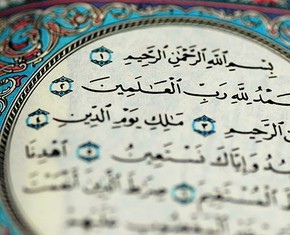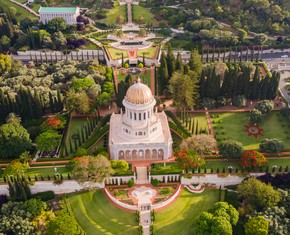The views expressed in our content reflect individual perspectives and do not represent the authoritative views of the Baha'i Faith.
Every November 26th, Baha’is around the world celebrate the unity of their Faith on the Day of the Covenant – but what, people ask, is a “Covenant?”
We typically understand a covenant as an agreement, a compact, a bond or a promise. In the scriptural sense, across many different religious traditions, a covenant has always represented an agreement between God and humanity, in which God makes promises to His people and usually requires faithfulness from them in return.
In the Hebrew Tanakh, which Christians know as the Old Testament, God made explicit covenants with Adam, Noah, Abraham, and Moses. The symbolic “covenant of the rainbow” between God and Noah in Genesis serves as just one example:
And God spake unto Noah, and to his sons with him, saying, And I, behold, I establish my covenant with you, and with your seed after you; And with every living creature that is with you, of the fowl, of the cattle, and of every beast of the earth with you; from all that go out of the ark, to every beast of the earth. And I will establish my covenant with you, neither shall all flesh be cut off any more by the waters of a flood; neither shall there any more be a flood to destroy the earth.
And God said, This is the token of the covenant which I make between me and you and every living creature that is with you, for perpetual generations: I do set my [rain]bow in the cloud, and it shall be for a token of a covenant between me and the earth. – Genesis 9:8-16.
The overall covenant God made with His followers in Judaism, known to Jews as the Mosaic Covenant, and to Christians as the Old Covenant, put forth the stipulation of the oneness of God – “Thou shalt have no other gods before me” (Exodus 20:2) – as the primary law of the Ten Commandments. In exchange for following those principles, God promised that he would never leave His followers without guidance:
Be strong and of a good courage, fear not, nor be afraid … for the Lord thy God, he it is that doth go with thee; he will not fail thee, nor forsake thee. – Deuteronomy 31:6.
This eternal covenant between God and humanity, the Baha’i teachings say, remains in force today. The Creator has bestowed bounties on us all, and in return asks us to recognize His prophets and messengers and abide by their laws and spiritual principles. The Baha’i teachings joyously celebrate that covenant:
The divine springtime was here, pitching its tents in this contingent world, so that all creation leapt and danced. The withered earth brought forth immortal blooms, the dead dust woke to everlasting life. Then came forth flowers of mystic learning, and, bespeaking the knowledge of God, fresh greenery from the ground. The contingent world displayed God’s bounteous gifts, the visible world reflecting the glories of realms that were hidden from sight. God’s summons was proclaimed, the table of the Eternal Covenant was readied, the cup of the Testament was passed from hand to hand, the universal invitation was sent forth. – Abdu’l-Baha, Selections from the Writings of Abdu’l-Baha, p. 7.
So today, the Baha’i Holy Day called the Day of the Covenant recognizes the overall concept of a lasting covenant between God and humanity – which finds expression in every Faith, and in all Faiths.
For Baha’is the idea of that covenant underpins one of the core principles of the Baha’i teachings – progressive revelation – which means that God has revealed religious and mystical truth in a systematic succession of prophets and messengers throughout history.
Baha’is see the great spiritual teachers, the founders of the world’s major Faiths, as revealing different stages in one continuous spiritual educational system for humanity. Being a Baha’i means accepting those messengers, and recognizing the common basis of them all:
Baha’u’llah promulgated the fundamental oneness of religion. He taught that reality is one and not multiple, that it underlies all divine precepts and that the foundations of the religions are, therefore, the same. Certain forms and imitations have gradually arisen. As these vary, they cause differences among religionists. If we set aside these imitations and seek the fundamental reality underlying our beliefs, we reach a basis of agreement because it is one and not multiple. – Abdu’l-Baha, The Promulgation of Universal Peace, p. 175.
To carry out this eternal covenant, each of those messengers of God made a promise to their followers that they would return, their reality re-appearing to lead humanity to God once more. That permanent covenant, which calls on every person of faith to recognize and accept the next prophet of God, forms the basis of the system of divine education called progressive revelation.
In other words, Baha’is see the unity of religion as an organic, unbroken chain of God’s messengers, who all taught the same essential Faith.
This great covenant – God’s promise never to leave His creation bereft of guidance – has held true throughout every era and civilization:
Abraham, on Him be peace, made a covenant concerning Moses and gave the glad-tidings of His coming. Moses made a covenant concerning the promised Christ, and announced the good news of His advent to the world. Christ made a covenant concerning the Paraclete and gave the tidings of His coming. The Prophet Muhammad made a covenant concerning the Bab, and the Bab was the One promised by Muhammad, for Muhammad gave the tidings of His coming. The Bab made a Covenant concerning the Blessed Beauty, Baha’u’llah, and gave the glad-tidings of His coming, for the Blessed Beauty was the One promised by the Bab. Baha’u’llah made a covenant concerning a Promised One Who will become manifest after one thousand or thousands of years. – Abdu’l-Baha, Baha’i World Faith, p. 358.
Baha’u’llah’s Covenant continues that unbroken chain of divine guidance and love, not only by promising that another universal Faith will come in the future, but by appointing Abdu’l-Baha to lead the Baha’i Faith after its founder’s passing. Abdu’l-Baha fulfilled the Covenant by appointing Shoghi Effendi as the Guardian of the Baha’i Faith, and today the democratically-elected Universal House of Justice continues to demonstrate the unifying power of the Baha’i Covenant.
Unique in religious history, those successive appointments provide the organizing principle for the continuation of the Baha’i teachings and the administration of the growing Baha’i community around the world, as well as answering the divisive questions of succession and leadership that have troubled so many past religions.
Because of that Covenant, the Baha’i Faith has survived for more than 175 years without schism or sectarianism, and with its unity firmly established all around the world. Baha’is come from every culture, every country, every former Faith, every economic class and every racial group. That remarkable accomplishment, also unique in religious history, means that Baha’is all over the world believe in and adhere to a single unified Faith:
O ye that dwell on earth! The religion of God is for love and unity; make it not the cause of enmity or dissension … That which is conducive to the regeneration of the world and the salvation of the peoples and kindreds of the earth hath been sent down from the heaven of the utterance of Him Who is the Desire of the world. Give ye a hearing ear to the counsels of the Pen of Glory. Better is this for you than all that is on the earth. – Baha’u’llah, The Book of the Covenant, Tablets of Baha’u’llah, p. 219, p. 221.
Baha’u’llah’s appointment of Abdu’l-Baha as the Center of the Covenant invested him with the authority to function as the sole interpreter of the Baha’i writings, and named him as the one who would carry out Baha’u’llah’s purpose in the establishment of the Baha’i administrative order. The appointment of Abdu’l-Baha as the Center of the Covenant also recognized that in his personal life, in his words and deeds, Abdu’l-Baha exemplified the qualities and ideals of a true Baha’i. The unique combination of these functions in one person created an unprecedented station in all religious history, and made Abdu’l-Baha a singular, revered and beloved figure, renowned around the world for his humility, his knowledge, his service to humanity and his advocacy of global peace and unity. Today, Baha’is everywhere recognize and celebrate Abdu’l-Baha’s life and teachings.
















Comments
Sign in or create an account
Continue with Googleor